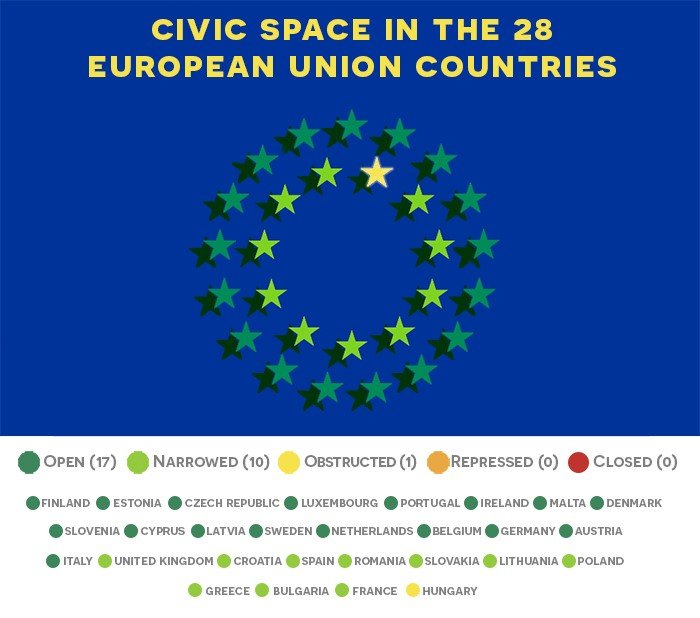Inter-governmental indexes
Indexes for intergovernmental meetings and bodies
Scroll over the visualisations below for more information:
August 2018: Civic Space in the G20
April 2018: Civic Space in ASEAN Countries
April 2018: Civic Space in Commonwealth Countries
February 2018: Civic Space in the EU

February 2018: Civic Space in UN Members States Adopting Universal Periodic Reviews
February 2018: Civic Space in African Countries with Upcoming Elections
November 2017: Civic Space in BRICS countries
From 3 - 5 September, the leaders of Brazil, Russia, India, China and South Africa are gathering in Xiamen, China for the 9th BRICS Summit. Accounting for over 40% of the world’s population and a significant portion of its GDP, BRICS countries individually and collectively exercise substantial regional and global influence. Recent research from the CIVICUS Monitor, a collaborative new research platform, shows that civic space is worryingly “repressed” in China and Russia, “obstructed” in Brazil and India and “narrowed” in South Africa. The most recent “Civil BRICS” meeting in China in June this year was tightly controlled, with the concluding declaration having been pre-drafted before the meeting even took place. No preparatory consultations were conducted and there was little meaningful opportunity for civil society organisations to influence the process. It’s high time that BRICS governments expanded the scope of these exchanges to discuss avenues for citizen participation in the future direction of BRICS cooperation. Healthy involvement of civil society can only enhance the legitimacy of the outcomes of BRICS summits in the eyes of the world. Guaranteeing respect for citizens’ fundamental freedoms at home is also essential.
Brazil
- In 2016 alone, 49 land defenders were killed. This year, human rights defenders continue to be targeted, and at least 33 defenders have been killed in 2017.
- The situation for journalists is little better. The freedom to express dissent, and to criticise the government is severely constrained. At least five journalists were killed in 2016 for exercising the right.
- During the 2016 Olympic Games, intolerance for dissent and peaceful protests grew. Security forces used violence to suppress the peaceful demonstrations that were being held outside the stadiums. Anti-government protesters were subjected to the same treatment.
Russia
- Independent organisations face constant threat of closure under the notorious Foreign Agent Law and some are forced to operate in exile.
- Russian LGBTI rights organisations and activists are harassed and intimidated, and members of the community remain in a precarious situation.
- In response to the growing crackdown, Russians have taken to the streets in mass protests. On 26th August, between 1,000 and 1,500 people rallied on Moscow’s streets in the second March for Internet Freedom against laws that censor and restrict internet use.
India
- In 2016, thousands of civil society organisations were viewed to have violated the Foreign Contribution Regulation Act (FCRA) and had their licenses revoked; barring them from accessing international funds.
- Several prominent international and human rights focussed NGOs have spearheaded a fightback and since had their licenses reinstated.
- While some Indian civil society groups have formally engaged with BRICS, questions have been raised over the tokenism of their engagement. Although a few select civil society groups have taken part in pre-meetings - their impact on the grouping remains questionable.
China
- Since 2014, a series of restrictive new laws on national security, non-profit organisations and anti-terrorism have been passed, coinciding with a sustained escalation of detentions of dissidents.
- Aside from laws, China has relentlessly pursued its critics through mass arrests of lawyers and activists in 2015, the shutdown of websites promoting peaceful dialogue and deploying riot police to prevent a demonstration on poor air quality in Chengdu.
- Following the death in July 2017 of Nobel Peace Prize Laureate Liu Xiaobo, authorities tightly controlled his burial at sea to prevent a commemoration, arrested activists after his funeral and orchestrated the subsequent disappearance of his widow, Liu Xia, whom they have held in arbitrary detention since 2010.
South Africa
- At least 567 people were arrested during the #FeesMustFall# protest movement while the police were accused of using excessive violence during the student protests.
- Five years on from the Marikana massacre, when police officers used lethal force, killing 34 striking miners and injure more than 70 in a single incident, the survivors and the family of the killed miners have yet to see justice.
- Recent attacks on journalists have targeted those working on exposing corruption, particularly reporters exposing the extent of state capture by prominent business family, the Guptas.
Follow #civicusmonitor on social media for the latest civic space updates from around the world.